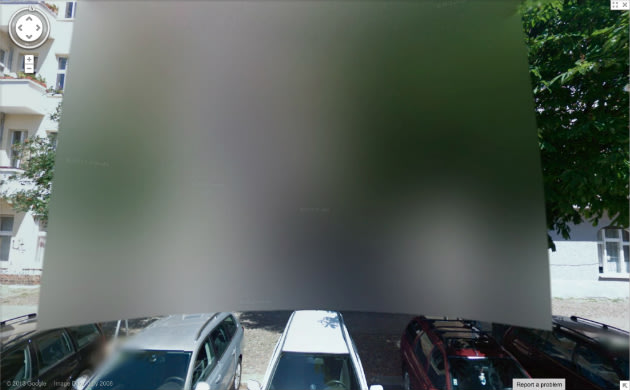 In 2010, a quarter of a million Germans forced Google to pixelate their houses on Street View. (Yahoo News)
In 2010, a quarter of a million Germans forced Google to pixelate their houses on Street View. (Yahoo News)
Editor's Note: Marc Young is an American journalist based in Berlin. He is covering President Barack Obama's visit to Germany for Yahoo News.
BERLIN?While NSA whistleblower Edward Snowden recently went underground in Hong Kong, he could have chosen from countless of locations in Germany, including my own home, that simply don?t exist?at least not online.
Germans take their data protection extremely seriously?making their country perhaps the worst possible place for President Barack Obama to visit this week in the aftermath of Snowden?s exposure of the National Security Agency?s massive surveillance program.
The NSA affair threatens to overshadow what was meant to be a pleasant visit for both Obama and German Chancellor Angela Merkel following the G8 summit in Northern Ireland. Obama plans to mark the 50th anniversary of John F. Kennedy?s historic ?Ich bin ein Berliner? speech, while Merkel is looking for a presidential photo-op just three months before an election.
My missing home is just one example of how strongly Germans feel about protecting their online identities.
One of my Berlin neighbors forced Google to pixelate the fa?ade of my apartment building on its popular Street View service a few years ago in the name of Teutonic privacy. Whether I liked it or not, my home was pixel bombed into oblivion.
In fact, so many people have opted to blot out their houses that web guru Jeff Jarvis said at the time Germany had ?digitally desecrated? its online landscape.
?Data protection is a basic right in Germany, unlike in the USA,? Peter Schaar, the German government?s data protection commissioner, told Yahoo News. ?It?s not really surprising what the NSA was doing?but the scope is astonishing.?
Keenly aware of how sensitive Germans are about their privacy, Merkel has made clear she would ask Obama directly about the NSA?s snooping during his trip to Berlin this week.
One of Merkel?s fellow conservative politicians, Markus Ferber, even accused the U.S. intelligence agency of behaving like East Germany?s infamous secret police, the Stasi, which had an unquenchable thirst for surveillance of its own oppressed citizens.
Through coercion and fear, the Stasi managed to turn communist East Germany into nation of informants, where not even friends and family could be trusted. It cataloged everything, including the scent samples of unreliable citizens, just in case they eventually needed to be hunted down by the secret police?s attack dogs.
?The excessive American need for control clearly goes too far if the privacy of internet users around the world is so deeply infringed upon,? Ferber, a member of the European Parliament, told the Reuters news agency, adding the NSA was guilty of using ?American-style Stasi methods.?
Schaar called Ferber?s claim ?nonsense.?
?We Germans should be particularly carefully about making such comparisons, especially since the United States has a longer democratic tradition than Germany,? Schaar said.
But Schaar did admit Germans? troubled history with both Communist dictatorship and the Nazis had certainly helped shaped their cautious attitudes towards data protection.
Florian Resatsch, managing director of mobile media for advertizing firm Str?er, said Germans are half as likely to allow location-targeted services on their smartphones as British users.
?It feels like the Germans are more afraid to reveal where they are,? he told Yahoo News.
Not that he?s any different. The tech entrepreneur, who started a Foursquare-style mobile check-in platform called Friendticker, doesn?t have Berlin listed as his hometown on his own Facebook page.
?Nobody is forced to hand over information to Facebook,? Resatsch said. ?And if I send an email to the USA, I?m aware the NSA might pick it up. It?s not paranoia, it?s a logical assumption.?
In his interview with Yahoo News, data protection commissioner Schaar expressed particular concern that the NSA had even been given access to the computer servers of U.S. Internet companies on European soil.
?There?s been an immense loss of trust in U.S. firms,? he said, explaining that millions of European customers might now think twice about using the services of Google and Facebook if they?re unable to ensure the integrity of users? personal information.
Schaar also said Germany?s robust approach to data protection could gain currency in other countries in the wake of the NSA leak. ?People should have informational self-determination,? he said.
That?s a very German sentiment, but not everyone here agrees data protection concerns are always paramount.
?Anyone with real authority for the safety of citizens in Germany in Europe knows that it?s the U.S. intelligence services that have repeatedly given us correct information,? German Interior Minister Hans-Peter Friedrich told the Sunday edition of newspaper Die Welt. ?They?ve helped us hinder several attacks and save lives.?
And a recent YouGov survey showed 40 percent of Germans were willing to accept blanket government surveillance if it protected them from terrorism.
Perhaps opening the Bavarian chapter of the Edward Snowden fan club in a pixelated building in Munich would be premature after all.
Source: http://news.yahoo.com/blogs/ticket/edward-snowden-hiding-wrong-country-120521507.html
awake mario batali lone ranger aaron brooks dave matthews band solar flares 2012 whitney houston will
No comments:
Post a Comment